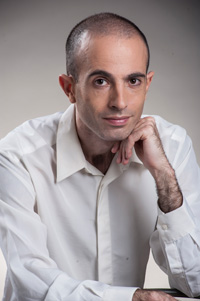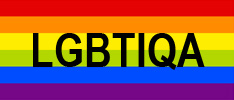In his recently published book, Yuval Noah Harari browses through hundreds of thousands of years of human history – and asks questions his colleagues seldom ask. The woxx talked to him during his European book presentation tour.

Yuval Noah Harari, 38, teaches history at the Hebrew University of Jerisalem. His book « Sapiens: A Brief History of Humankind », published in Hebrew in 2011, has already been translated into a dozen of languages.
Your book covers pretty much the entire humankind’s history, and even suggests what may happen to us humans next. It also goes beyond history to talk a lot about science, and biology in particular. What was the path that led you, originally a medieval and military history specialist, to embrace such a holistic endeavour?
When I was a teenager, I became very troubled by the fact that I don’t understand what is really happening in the world, why things are the way they are, and what is the aim and meaning of life. I asked my parents, my teachers, and other grown-ups, and shockingly, it turned out that they too didn’t really understand life. But I was even more amazed by the fact that they seemed not to care about it. They were very worried about money, about careers, about the mortgage, about the political situation – but were completely nonchalant about the fact that they don’t understand what life is all about. I promised to myself that when I’ll grow up, I will not get bogged down in the mundane troubles of daily life, and will do my best to understand the big picture. Writing the book was, in a way, fulfilling this promise I made to myself.
My aim in writing the book was not to give a survey of facts and names and dates. But rather, to decipher the deeper mechanisms of history. To understand how our reality came to be the way it is. How did we come to believe in gods, in individualism, and in human rights? How did we come to live in nation-states? How did capitalism become the dominant economic system of the whole world? How is it, for example, that all the people in the world – despite disagreeing about religion and politics – nevertheless believe in the same money? In order to answer such questions, it was necessary to incorporate studies from other disciplines, particularly biology. After all, Homo sapiens is an animal, and without understanding biology, you cannot really understand Sapiens. Biology is not enough but itself. You cannot understand the First World War or the current global economic crisis in biological terms. But biology is the foundation upon which history builds.
One of the first thought-provoking ideas you propose is that we, Homo sapiens, are now the only species of humans on Earth, and yet that wasn’t always the case. Why is this an important starting point?
We are used to thinking about ourselves as the only humans. The very idea that there could be humans from other species shocks many of us. This view reinforces the false belief that humans are completely different from all other animals; that they are not animals at all, but something else. For thousands of years religions such as Judaism and Christianity encouraged us to think that humans are separated from all other animals by an unbridgeable gap.
Yet 50,000 years ago – which is a very short time in evolutionary terms – earth was home to at least 6 different human species. Just as today there are many different species of bears in the world – polar bears, grizzly bears, brown bears, black bears – so 50,000 years ago there were many different species of humans. Sapiens, Neanderthals, Denisovans and others. Just imagine how different our view of the world would have been, if at least one of these other species had survived alongside us. How would the Bible have looked like in a world which contains not only Sapiens, but also Neanderthals? Would the book of Genesis tell us that Neanderthals too descend from Adam and Eve? What about Heaven and Hell? Would priests have proclaimed that good Neanderthals go to Heaven and evil Neanderthals to Hell? What about Communism and Liberalism? Would they have demanded equality and freedom for all humans, including Neanderthals, or only for Sapiens? Would we have Neanderthal parties running for parliament?
Homo sapiens began 70,000 years ago what is called the “cognitive revolution”. Is this really when we stopped being insignificant mammals, and why?
In the Cognitive Revolution, Sapiens acquired new cognitive abilities of thinking, learning and communicating, which enabled them to begin cooperating in large numbers. This turned Sapiens from insignificant apes into the most powerful force on earth, and created the first complex cultures. The Cognitive Revolution therefore marks the borderline between biology and history. Prior to that revolution, humans were quite ordinary animals, and their doings belong to the realm of biology. However, from the Cognitive Revolution onwards, what people do is history.
You argue that, after the cognitive revolution, “imagined realities” are at the centre of humankind’s organisations: these are things that do only exist in the collective minds of people like ghosts, laws, religions or corporations. These imagined realities differ through the course of history, might even be contradictory from one civilisation to another, but always are the foundation for people’s collaboration. There’s a very current example you use to make your point, the Peugeot company. Could you please elaborate?
Homo sapiens rules the world, because we are the only animal that can cooperate flexibly in large numbers. We can create mass cooperation networks, in which thousands and millions of complete strangers work together towards common goals. One-on-one, even ten-on-ten, we humans are embarrassingly similar to chimpanzees. Any attempt to understand our unique role in the world by studying our brains, our bodies, or our family relations, is doomed to failure. The real difference between us and chimpanzees is the mysterious glue that enables millions of humans to cooperate effectively.
This mysterious glue is made of stories, not genes. We cooperate effectively with strangers because we believe in things like gods, nations, money and human rights. Yet none of these things exists outside the stories that people invent and tell one another. There are no gods in the universe, no nations, no money and no human rights—except in the common imagination of human beings. You can never convince a chimpanzee to give you a banana by promising him that after he dies, he will get limitless bananas in chimpanzee Heaven. Only Sapiens can believe such stories. This is why we rule the world, and chimpanzees are locked up in zoos and research laboratories.
If this sounds bizarre, just think for a moment about business corporations, like Peugeot or Toyota or Google. What exactly are they? They are not the people working in them, or the managers, or the stockholders, or the buildings. The buildings could be destroyed, the workers fired, the managers replaced, and the stockholders could sell their stocks to somebody else – yet the corporation will continue to exist. Corporations are legal fictions. They are stories invented by lawyers, which have absolutely no existence outside our imagination. Yet these stories are today some of the most powerful forces on earth.
Would you therefore be comfortable being called “postmodern”, given the focus you have on debunking the myth of universal values? And why do you choose yourself to believe in the imagined realities you believe in?
I am postmodern up to a point. I embrace the postmodern emphasis on images being the most powerful forces in the world, and the postmodern deconstruction of myth. Yet I break from postmodernism in several important respects. Postmodernism is a process of pure deconstruction, which beyond a certain point becomes a sterile intellectual exercise. Postmodernism dislikes big narratives, and builds little in place of all the myths it deconstructs. In contrast, I do believe in big narrative. I have written one…
And I don’t think everything is just images. There are some real things in the world. The question that bothers me most is „what is really real?“. I think the best place to start giving an answer to that question is suffering. Suffering is really real. It isn’t a myth. Myths might cause suffering on a grand scale, but the suffering itself is absolutely real. If you want to know whether something is real or not, just ask yourself „can it suffer?“. A nation cannot suffer, even if it loses a war. A bank cannot suffer, even if it crashes. That implies that these are just imaginary stories. Human beings, however, can suffer. Elephants can suffer. Chickens can suffer. They are real.
You state that the life of hunters-gatherers may well have been better than our life after the agricultural revolution, which you even call “history’s biggest fraud”. Isn’t that a pretty strong choice of words?
Actually, I borrowed the term from Jared Diamond, who called the agricultural revolution „the biggest mistake in history“. It sounds a very strong statement when you think about it from the viewpoint of the middle classes in the affluent societies of the 21st century. But it makes much more sense when you think about from the viewpoint of a medieval Chinese peasant, or of a sweatshop worker in today’s Bangladesh. The daily life of medieval Chinese peasants and modern sweatshop workers are much harder than the daily life of hunter-gatherers 20,000 years ago. It is a scandal that after thousands of years of immense technological and social progress, hundreds of millions of people are living harder lives than their ancestors. What would you rather do: work for 12 hours a day, 7 days a week, in a noisy, polluted and crowded factory, operating a machine that produces toys for European children – or to go out to the forest to look for mushrooms, climb trees to pick apples, and run after rabbits and gazelles?
According to you, we now live in a unified world, whose unification was powered by money, religion and empires, all three powerful imagined realities. So history does have a direction. Is it to say that globalisation, much talked about in the last decades, was indeed unavoidable?
In the long run, I think that globalization was indeed unavoidable. For thousands of years, history has been going in this direction. The best way to appreciate the general direction of history is to count the number of separate human worlds that coexisted at any given moment on planet Earth. Today, we are used to thinking about the whole planet as a single unit, but for most of history, Earth was in fact an entire galaxy of isolated human worlds.
How many different human worlds coexisted on Earth? Around 10,000 BC our planet contained many thousands of them. By 1000 BC, their numbers had dwindled to the hundreds, or at most a few thousand. By AD 1450, their numbers declined even more drastically. Today almost all humans share the same political system: the entire planet is divided into internationally recognized states. All humans share the same economic system: global capitalist market forces shape even the remotest corners of the world. All humans share the same scientific system: hospitals in Tehran, Tel Aviv and Tokyo have a similar conception of diseases and of the human body. And most humans increasingly share the same legal system: human rights and international law are valid everywhere, at least theoretically.
The single global culture is not homogenous. Just as a single organic body contains many different kinds of organs and cells, so our single global culture contains many different types of lifestyles and people, from New York stockbrokers to Afghan shepherds. Yet they are all closely connected and they influence one another in myriad ways. They still argue and fight, but they argue using the same concepts and fight using the same weapons.
A real “clash of civilizations” is like the proverbial dialogue of the deaf. Nobody can grasp what the other is saying. Today when Iran and the United States rattle swords at one another, they both speak the language of nation-states, capitalist economies, international rights, and nuclear physics. It is not as if Iran is a confederacy of nomadic shepherd tribes that wages war with hordes of mounted archers and witch-doctors, whereas the United States is a universal empire that wages war with hoplite phalanxes and monotheist priests. Both countries are nation-states waging war with the same kind of armies using the same kind of science and technology.
You write that “history began when humans invented gods, and will end when humans become gods.” Is that also an unavoidable fate for us humans? Although it may sound like eugenics and augmented humanity in the making, you seem not to be particularly scared about it.
Given current technological advances, it seems unavoidable that in the not-too-distant future, humans will become gods. I.e., humans will acquire abilities that were traditionally thought to be divine abilities. Humans will probably be able to live indefinitely, to design and create living beings at will, to link to the internet with their mind, and to change their own bodies and minds at will. This will result in enormous new opportunities, as well as frightful new dangers. There is no point being optimistic or pessimistic about it. We need to be realist. We need to understand that this is really happening – it is science rather than science fiction – and it is high-time we start thinking about this very seriously. Most of the problems that worry governments and private citizens alike are insignificant by comparison. The global economic crisis, the Islamic State, the situation in the Ukraine – these are all important problems, of course. But they are completely overshadowed by the question of human enhancement.
While your book in its vast majority tries to be balanced and reflects current research, you do sporadically make strong personal points. These include true empathy while discussing the suffering inflicted by the agricultural revolution to domesticated animals, a very puzzled and also empathic view on why men have throughout history always had superior status over women, and what seems to be a taste for empires. Was that a conscious choice to reveal your opinions on these subject and why these in particular?
I think in all these cases, I am still stating well-founded scientific positions rather than just personal views. However, because these positions are nonconformist, they may seem to be „personal views“. For example, I think there is overwhelming scientific evidence indicating that animals have emotions and sensations, and that the practices of human agriculture are causing immense suffering to the animals. Similarly, I know that it is very unfashionable today to speak positively about empires. To accuse somebody of being an „imperialist“ is probably the worst thing you can say about a political opponent, short of calling him or her „fascist“. But for the last 2500 years, empire was the most successful political system of humankind, and most of us are heirs to imperial cultures. Most of us speak and dream in imperial languages such as English, Spanish, Chinese and Arabic.
Perhaps I am more favourably disposed to empires because of my family roots. I come from an East-European Jewish family. For us, the best time was under the Habsburg Empire. When this empire ruled eastern Europe, everyone was a minority, and Jews prospered. My great-grandfather served in the army of Emperor Franz-Josef in the First World War. Then the empire collapsed due to the rise of nationalism, and all hell broke loose. Eastern Europe had 20 unstable years of ultra-nationalist governments, then came the Second World War and the Holocaust, then the Communist dictatorships, and when these collapsed, what did we get? The European Union, which is another kind of empire. It would have been far easier and better for everybody, not only Jews,
if we just kept the Habsburg Empire…
How did you decide to broadcast your course to tens of thousands of people on a MOOC?
My university, the Hebrew University of Jerusalem, offered to give 4 MOOC courses, and asked me to prepare one of them. It sounded like an excellent opportunity to reach a much wider and more diverse public, so I took it. Since I am doing global history, it seems very reasonable to address a global audience.
Your ideas can be at times controversial and create heated discussions in the MOOC forum. Although you seldom have time to participate yourself in these, what have you learnt from this experience?
I follow some of the discussions, but I don’t interfere in them, because I talk enough on the lectures… It is very important to practice silence. I am particularly impressed by the way that students from very distant parts of the world engage in common debates, and even though they often have disagreements, they can nevertheless listen to one another and understand what others are saying. This is an excellent illustration of the power of globalization. At no previous time in history could students from China, Egypt, Luxembourg and Argentina engage so easily and fruitfully in a common debate.
You started our conversation by alluding to your teenage questions on the meaning of life. So what do you know about it now?
The meaning of life is an imaginary story that our mind keeps generating every moment. We keep changing the story, and we always have tremendous attachment to the latest version. Yet no version ever satisfies us. Even when everything is just perfect, the typical reaction of the mind to good things is not satisfaction, but rather craving for something even better.
So it’s useless to ask what the meaning of life is. It will only entangle us in the imaginary stories the mind invents. Instead, we had better focus our efforts on understanding the deep mechanism of our mind, and in particular on why the mind reacts to good things with craving rather than with satisfaction.
What can we expect next from you based on your current research?
My next book is about the human agenda for the 21st century. What will be the main projects, problems and opportunities of humankind in the coming century?




